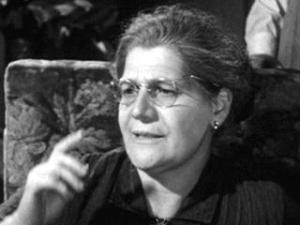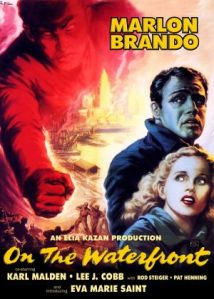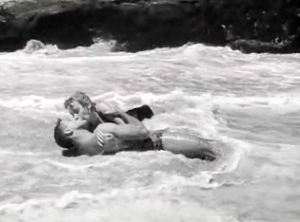“See, dogs like us, we ain’t such dogs as we think we are.” – Marty (Ernest Borgnine) giving the ultimate in left handed compliments, Marty
If you were looking for a trend in the Best Pictures from the mid-1950s, average people struggling to get by in the big, cruel world would be a good starting point. From Here to Eternity and On the Waterfront both had everyday Joe’s toiling against corrupt systems, lost among the bigness of society. 1955’s Best Picture, Marty, took this new fascination with the struggles of the “little guy” even farther. One of the more unusual Best Pictures in terms of scope and theme, Marty is an unglamorous tale of an unglamorous man with unglamorous dreams. It’s a sweet little movie that is lifted by a great performance by the year’s Best Actor, Ernest Borgnine.
Marty is a 34-year-old bachelor who still lives with his mother in inner city New York. The oldest of a large brood of siblings, Marty is the only one who hasn’t married, causing him to be constantly bombarded with the question “When are you going to get married, Marty?” Marty has more or less given up on any aspirations of love, and has settled into a boring, uncontended life with some equally bored pals. After being guilted by his mother, he attends a dance club, where after another night of rejection, he meets Clara (Betsy Blair), a plain Jane school teacher who has been abandoned by her blind date and also carries the baggage of years of rejection. The two have an instant connection and spend the whole night talking.
But events are conspiring against Marty. In a seemingly unrelated subplot, Marty’s mother has agreed to take in her sister, Catherine. Catherine had been living with her son and daughter-in-law and fighting with them constantly, turning all parties involved quite bitter. Catherine warns Marty’s mother that all children turn against their mothers when they finally find love and wouldn’t you know it? Suddenly Marty has found love and his mom isn’t so sad to have a bachelor son around. So after being lambasted by his mom and jealous neighborhood pals, Marty decides to cut Clara loose until a last minute change of heart moves us to a happy ending.
Marty, like its title character is a very plain sort of movie. It’s mostly a slice-of-life piece about 24 hours in Marty’s life. Many of the characters – the jolly, plump mug with a sweet heart, the nagging worrying mother, the bitter old widow – come off like stereotypes today, although it is possible (although probably not true) this is the movie where a lot of these stereotypes come from. The movie lives and dies on Marty’s shoulders and in this case it is very lucky because Ernest Borgnine is GREAT. He is instantly likeable and sweet. You feel sorry for him when he is shunned for a dance and happy when he’s excited by the possibility of real love (“I’m going to have a date for New Years!”).
I felt the story itself was a little weak. It felt both rushed, padded at times, and oddly structured. The movie is only 94 minutes long – the shortest Best Picture in Oscar history – and Marty’s major conflict, should he stick by Clara, only comes around in the final twenty minutes. In a lot of ways, this movie is a lot like Sunrise where in the first third of the movie a lot happens, in the second third the characters enjoy there happiness but there isn’t much in the way of actual stuff happening, and in the final third, a sudden, near-tragedy occurs that almost derails everything. John Candy made a very similar movie to this in the early 1990s called Only the Lonely and its story took place over the course of months, not 24 hours. Marty’s decision to go back to Clara is unsatisfying because we only see him call her; we don’t actually get to see them reunited.
Another strange aspect is the ages. The bitter aunt is said to be only 56, but she gimps like a rheumatic 80-year-old. It also doesn’t really make sense she’d be abandoned and bounced around like she is, given she should still be spry at that age.
I liked Marty for certain reasons. One crazy night movies hold a special charm for me, even if the night isn’t that crazy. As noted I thought Borgnine was great. And much like the moral of the movie, it’s nice to root for the little guy to win Best Picture on occasion.
Other Oscars: Ernest Borgnine, Best Actor; Delbert Mann, Best Director; Best Writing, Screenplay
Box Office: $3 Million (Not Top Ten for the Year, which had a cut-off of $4.6 million)
Other Notable Movies of 1955: Cinerama Holiday$, Mister Roberts*, Oklahoma!, Guys and Dolls, Lady and the Tramp, The Seven Year Itch, Blackboard Jungle, Love is a Many Splendored Thing*, Picnic*, The Rose Tattoo*, East of Eden, Davy Crockett, The Kentuckian, It’s Always Fair Weather, The Man With the Golden Arm, Rebel Without a Cause
*Best Picture Nominee
$Top Grossing Movie: $10 million











